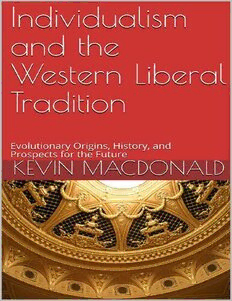
Individualism and the Western Liberal Tradition: Evolutionary Origins, History, and Prospects for the Future (2019) PDF
Preview Individualism and the Western Liberal Tradition: Evolutionary Origins, History, and Prospects for the Future (2019)
I NDIVIDUALISM AND THE W L T ESTERN IBERAL RADITION: E O VOLUTIONARY RIGINS, H P ISTORY, AND ROSPECTS F FOR THE UTURE K M D EVIN AC ONALD K D P E INDLE IRECT UBLISHING DITION C K M D OPYRIGHT © 2019 EVIN AC ONALD A LL RIGHTS RESERVED. ISBN -13: 9781089691488 PREFACE CHAPTER 1: RECENT POPULATION GENETIC RESEARCH Three Distinct Population Movements in Pre-historic Europe Percentages of Admixture of WHGs, EFs, and I-Es The Pitted Ware Culture of Coastal Scandinavia Further Evidence for North-South WHG and EF Genetic Clines Selection for General Cognitive Ability and Physical Traits Genetic Differences within Contemporary Europe Mirror Geography Sex-Chromosome Data Conclusion CHAPTER 2: THE INDO-EUROPEAN CULTURAL LEGACY: ARISTOCRATIC INDIVIDUALISM Indo-European Culture Technological Advances Domestication of Horses Sophisticated Wagons The Secondary Products Revolution Social/Cultural Practices The Militarized Culture of the Indo-Europeans Reciprocity as a Trait of I-E Culture Breaking Down Bonds of Kinship The Rewards of Military Success Indo-Europeanism as a Free-Market, Individualist Culture Sippe and Männerbünde Aristocratic Individualism in Ancient GREECE Aristocratic Individualism among the Germanic Peoples after the Fall of the Western Empire How Ethnically Cohesive Were Germanic Groups in Late Classical and Early Medieval Europe? Conclusion APPENDIX TO CHAPTER 2: ROMAN CULTURE: MILITARIZATION, ARISTOCRATIC GOVERNMENT, AND OPENNESS TO CONQUERED PEOPLES The Indo-European Roots of Roman Civilization: The Military Ethos of the Roman Republic The Roman Family Roman Public Religion The Aristocratic, Non-Despotic Government of Rome The Openness of Roman Society: Social Mobility and Incorporating Different Peoples Plebeian Upward Mobility Upward Social Mobility of Incorporated Peoples Conclusion: Rome as a Failed Group Evolutionary Strategy CHAPTER 3: THE NORTHERN HUNTER-GATHERER LEGACY IN EUROPE: EGALITARIAN INDIVIDUALISM Egalitarianism as a Distinguishable Component of Western Culture The Ecological Argument for the Individualism of Northern Hunter-Gatherers The Social Complexity of Northern European Hunter-Gatherers Egalitarianism as a Fundamental Trait of Northern Hunter-Gatherers Exogamy as Characteristic of Western Marriage Love as Central to Western Marriage Psychological Differences between WEIRD People and the Rest Social Exchange and Altruistic Punishment Other Psychological Tendencies of WEIRD People Moral Reasoning Cognitive Differences Conclusion CHAPTER 4: THE FAMILIAL BASIS OF EUROPEAN INDIVIDUALISM Marriage in Western Europe: Some Basic Differences Descriptive Data on Family Patterns in Northwestern and Southern Europe Characteristics of the Moderately Individualist Family System of Northwest Europe Dating the Origins of the Individualist Family Disadvantages of the Individualist Family Contextual Influences Proposed as Causing Moderate Individualism Moderate Collectivism in Southern Europe versus Moderate Individualism in Northwest Europe Egalitarian Trends in Northern Europe Northwest European Non-Manorialized Areas Germanic versus Irish Kinship Germanic Kinship Irish Kinship The Ethnic Argument State-Supported Extreme Individualism in Scandinavia Conclusion CHAPTER 5: THE CHURCH IN EUROPEAN HISTORY Implicit and Explicit Processing: How Ideology Motivates Behavior Ideology and Social Controls Supporting Monogamy in Western Europe The Papal Revolution: Establishing the Image of the Church as an Altruistic Institution The Papal Revolution: The Church’s Power Over Secular Elites Medieval Ecclesiastical Collectivism Social Controls and Ideology Maintaining Socially Imposed Monogamy Policing Sexual Behavior in the Middle Ages and Later Ideologies Promoting Monogamy Conclusion Effects of Monogamy Monogamy as a Precondition for the European “Low-Pressure” Demographic Profile and the Industrial Revolution Monogamy and Investment in Children Christianity in Opposition to the Ancient Greco-Roman Aristocratic Social Order Christianity in Post-Roman Europe The Church in Pursuit of Power The Church’s Ideology of Moral Egalitarianism as an Instrument of Furthering Its Power Church Policy in Opposition to the Power of Extended Kinship Groups The Church’s Encouragement of Diverse Centers of Power Christianity and the Rational Tradition of the West The Realism Versus Nominalism Debate Christianity and Post-Medieval Europe Conclusion: The Church Facilitated but Did Not Cause Western Individualism CHAPTER 6: PURITANISM: THE RISE OF EGALITARIANISM INDIVIDUALISM AND MORALISTIC UTOPIANISM Puritanism as a Group Evolutionary Strategy John Calvin’s Group Strategy Puritanism in New England Puritan Families Child-rearing Practices Intelligence and Emphasis on Education Puritan Names as Ingroup Markers Community Control of Individual Behavior: Puritan Collectivism Was Puritanism a Closed Group Evolutionary Strategy? Decline of Puritan Group Boundaries The Puritan Revolution in England The Puritan Revolution in the United States Nineteenth-Century Puritan-Inspired Intellectual Trends: Secular Versions of Moral Utopianism Transcendentalism as a Movement of Puritan-Descended Intellectuals Prominent Transcendentalists Orestes Brownson (1803–1876) George Ripley (1802–1880) Amos Bronson Alcott (1799–1888) Ralph Waldo Emerson (1802–1882) Theodore Parker (1810–1860) William Henry Channing (1810–1884) Transcendentalist Activism on Behalf of Social Justice Transcendentalism: A Summing Up The Uneasy Association between Anglo-Saxon Individualism and Ethnic Identification in the Nineteenth Century Self-interest and Liberal Ideology Other Liberal Nineteenth-Century Intellectual Currents Libertarian Anarchism Liberal Protestantism Academic Cultural Determinism The Secular Left The Period of Ethnic Defense: 1880–1965 Conclusion CHAPTER 7: MORAL IDEALISM IN THE BRITISH ANTISLAVERY MOVEMENT AND THE “SECOND BRITISH EMPIRE” The Wider Context of the Age of Benevolence The Psychology of Altruism and Moral Universalism The Personality System of Empathy Moral Idealism and the Ideology of Moral Universalism Philosophical Antecedents Empathy and Abolitionism Empathy and Ideology in Opposition to Slavery: Quakers, Evangelical Anglicans, and Methodists Quakers Evangelical Anglicans Methodists Puritanism as a Prototype of the Age of Benevolence “The Second British Empire” in the Nineteenth Century: A Kinder, Gentler Place The Morant Bay Rebellion in Jamaica and Its Supporters in England David Hackett Fischer on the “Second British Empire” Free Speech in the United States and New Zealand The Affective Revolution in England: An Ethnic Hypothesis The Ethnic Origins and the Decline of the Aristocratic Ethos in Britain Conclusion CHAPTER 8: THE PSYCHOLOGY OF MORAL COMMUNITIES Social Identity Processes as an Adaptation for Moral Communities The Role of Empathy in Moral Communities: Altruism—and Pathological Altruism Controlling Ethnocentrism: Implicit and
